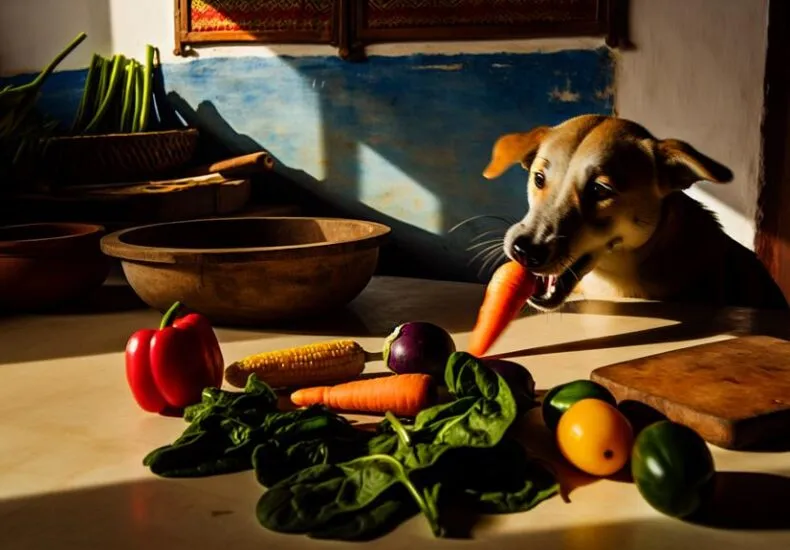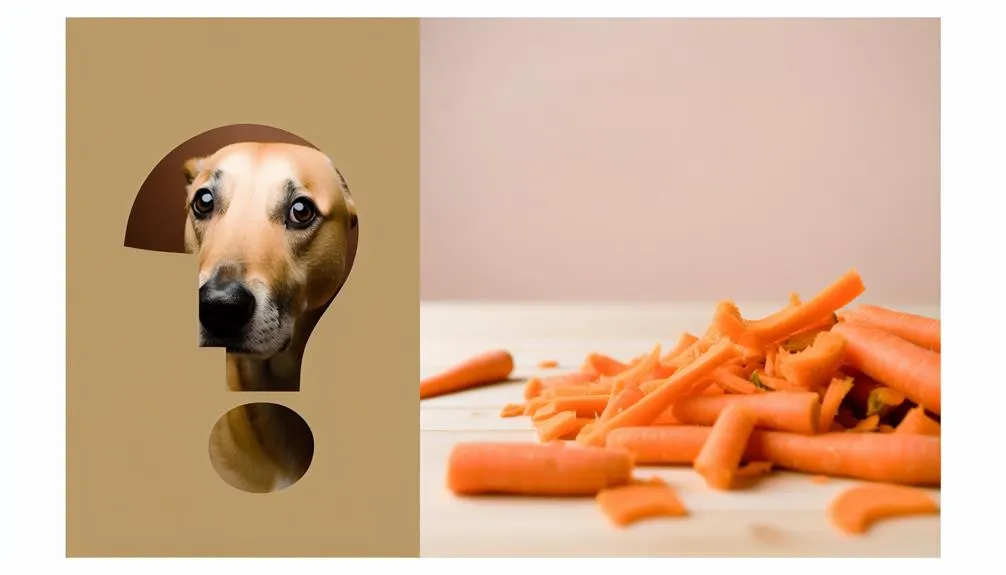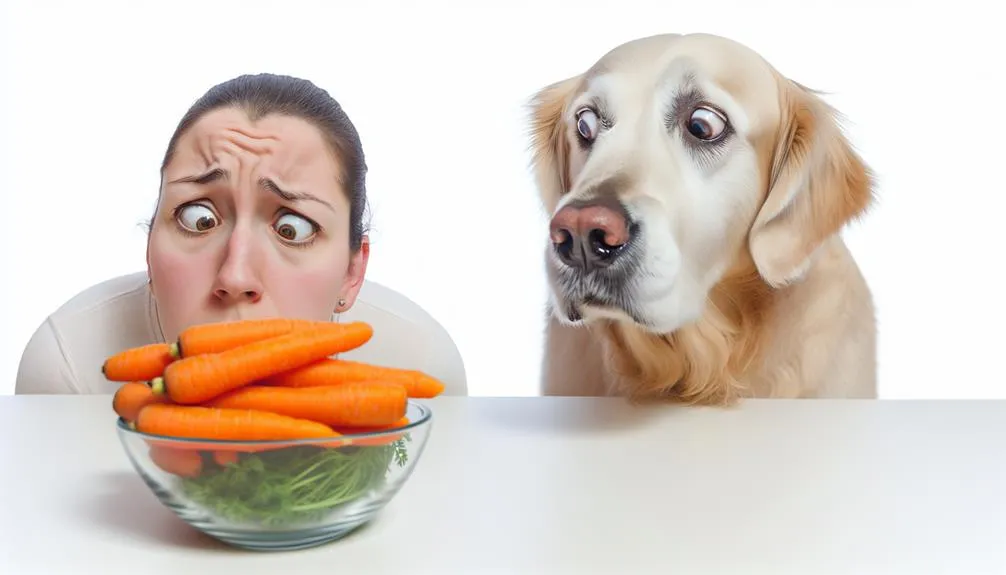
Can Dogs Eat Carrots
You might be wondering if it's safe for your dog to munch on a carrot or two. While many pet owners find that these crunchy vegetables can be a Healthy snack option, there are some important considerations to keep in mind. From Nutritional benefits to potential risks, understanding how to properly introduce carrots into your dog's diet is essential. But before you toss that carrot to your furry friend, there are a few details you should know that could affect their well-being. What are those details?
Nutritional benefits of Carrots
Carrots' vibrant orange color isn't just visually appealing; it also signifies a wealth of Nutritional benefits for dogs. When you consider adding carrots to your dog's diet, you're introducing a low-calorie treat that's loaded with essential vitamins and minerals. Carrots are particularly rich in vitamin A, which plays a significant role in maintaining healthy vision, skin, and immune function. This is especially important for growing puppies or older dogs that may need a boost in their diet.
In addition to their impressive vitamin content, carrots provide significant fiber benefits. Fiber is essential for your dog's digestive health, promoting regular bowel movements and preventing constipation. Incorporating carrots into your dog's meals can help enhance their overall gut health, contributing to better nutrient absorption and a happier digestive system.
Moreover, the crunchiness of carrots can help reduce plaque and tartar buildup on your dog's teeth, promoting oral hygiene as they chew. This means that alongside the Nutritional benefits, you're also supporting their dental health, which is an important aspect of their overall well-being.
When you think about all these benefits—high vitamin content, fiber advantages, and dental health support—it's clear that carrots can be a valuable addition to your dog's diet. Just remember to introduce any new food gradually, ensuring your furry friend adapts well to this nutritious treat.
How to Prepare Carrots for Dogs
Preparing carrots for your dog can be a simple and rewarding process. First, you'll want to choose fresh, organic carrots if possible. Look for firm, brightly colored carrots, as these are typically more nutritious. Once you've selected your carrots, wash them thoroughly to remove any dirt or pesticides.
Next, consider your dog's preferences when it comes to carrot preparation. Some dogs prefer raw carrots, which can be crunchy and satisfying to chew. If your dog is one of these, simply cut the carrots into bite-sized pieces or sticks to make them easy to handle. Keep in mind that larger pieces can be a choking hazard, especially for smaller breeds.
If your dog isn't a fan of raw veggies, you might opt to steam or cook the carrots lightly. This method softens the carrots, making them easier to chew and digest. Just be sure not to add any seasoning, as many spices and additives can be harmful to dogs.
You can also mash or puree cooked carrots to incorporate into homemade dog treats or mix with their regular food, catering to their specific dog preferences.
Remember to introduce any new food gradually, monitoring for any adverse reactions. With these simple steps in carrot preparation, you can provide your dog with a tasty, nutritious snack that they'll likely enjoy!
potential risks of Carrots

While carrots can be a healthy treat for your dog, there are potential risks to contemplate. Some dogs may experience Digestive issues if they eat too many, and whole carrots can pose a choking hazard. It's important to monitor your dog and guarantee they're consuming carrots in safe, manageable pieces.
Digestive Issues
Although carrots are often touted as a Healthy snack for dogs, they can pose some digestive risks if not introduced properly. When dogs eat carrots, the fiber content can be beneficial, but it can also lead to digestive upset if your dog isn't used to it. Sudden dietary changes can result in gas, bloating, or diarrhea, so it's essential to introduce carrots gradually.
Carrot digestion varies among individual dogs, depending on their size, age, and overall health. Larger dogs may handle carrots better than smaller breeds, which might struggle with the fiber. If you notice any signs of discomfort after your dog has eaten carrots, consider reducing the amount or consulting your vet.
Moreover, while carrots are low in calories and high in vitamins, overindulgence can still disrupt your dog's digestive system. Always cut carrots into manageable pieces to aid digestion, as large chunks may be harder for your dog's stomach to process.
Choking Hazard
Cutting carrots into appropriate sizes is vital to prevent choking hazards for your dog. Whole or large carrot pieces can pose a significant risk, as dogs may try to swallow them without chewing. To guarantee choking prevention, slice carrots into small, manageable pieces or stick shapes that are easy for your dog to chew and digest.
Consider the size and breed of your dog when determining the right carrot shapes. Smaller breeds may require thinner slices, while larger dogs can handle slightly bigger pieces. Always supervise your dog while they're enjoying carrots, especially if it's their first time trying this crunchy treat.
Additionally, be aware of your dog's chewing habits. If they tend to gulp their food, it's even more important to cut carrots into smaller sizes. Remember, even healthy snacks can become dangerous if not prepared properly.
If you notice any signs of distress, such as coughing, gagging, or difficulty breathing after your dog eats carrots, seek veterinary assistance immediately. By taking these precautions, you can safely incorporate carrots into your dog's diet while minimizing choking risks.
Recommended Serving Sizes
When incorporating carrots into your dog's diet, it's essential to take into account the appropriate serving sizes to guarantee they reap the benefits without overindulging. The right amount of carrots can provide essential vitamins and fiber, but too much can lead to Digestive issues. Generally, serving sizes should vary based on your dog's size.
For small dogs, a serving of one to two baby carrots or a small slice of a larger carrot is usually sufficient. Medium-sized dogs can handle two to four baby carrots or one medium carrot cut into pieces. If you've got a larger breed, you can offer up to four to six baby carrots or one to two larger carrot pieces.
It's also important to reflect on serving frequency. Treating your dog to carrots a few times a week is ideal. You don't want to replace their regular meals with too many treats, even if they're healthy like carrots. Moderation is key to maintaining a balanced diet.
Always remember to introduce any new food gradually. Monitor your dog's reaction to carrots initially, and adjust the serving sizes as needed. If they enjoy them and tolerate them well, you can maintain the recommended serving sizes based on their size. This way, you make sure your furry friend enjoys the benefits of carrots while keeping their diet healthy and balanced.
Signs of Allergic Reactions

Dogs, like humans, can have Allergic reactions to certain foods, including carrots. While carrots are generally safe and healthy for dogs, it's important to be aware of potential Allergic reactions. Symptoms identification is vital; watch for signs like itching, swelling, gastrointestinal upset, or Respiratory issues. If your dog starts scratching excessively, developing hives, or shows signs of distress after eating carrots, it could indicate an allergy.
In addition to physical symptoms, behavioral changes can also be a red flag. If your dog suddenly becomes lethargic, refuses food, or seems unusually anxious, these may be signs of an allergic reaction. Keep in mind that reactions can vary in severity; some dogs may experience mild discomfort, while others could have a more severe response.
If you suspect your dog might be allergic to carrots, it's important to consult your veterinarian. They may recommend allergy testing to determine whether carrots or other foods are the culprits. Allergy testing can help pinpoint specific allergens, allowing you to make informed dietary choices for your pet.
In case of a severe allergic reaction, characterized by difficulty breathing or significant swelling, seek emergency veterinary assistance immediately. Timely intervention can be significant. Overall, being vigilant and knowledgeable about symptoms of Allergic reactions will help safeguard your dog's well-being when introducing new foods like carrots into their diet.
Alternative Vegetables for Dogs
If your dog shows signs of an allergy to carrots, you might want to explore alternative vegetables that can offer similar health benefits without the risk. There are plenty of vegetable alternatives that can serve as safe snacks while providing essential nutrients.
One excellent option is green beans. They're low in calories and high in fiber, making them a great choice for dogs needing to maintain a healthy weight. You can serve them raw, steamed, or even frozen for a invigorating treat on hot days.
Sweet potatoes are another nutritious alternative. Packed with vitamins A and C, as well as fiber, they can be cooked and mashed or cut into small cubes for a tasty addition to your dog's meals. Just make sure you don't add any seasoning.
Pumpkin is also a fantastic vegetable for dogs. It's rich in fiber and can help with digestion. You can provide it canned (make certain it's pure pumpkin, not pie filling) or cooked fresh.
Zucchini is a versatile choice too. It's low in calories and can be served raw, cooked, or even dehydrated as a Crunchy snack.
Lastly, broccoli can be a healthy option in moderation. It's high in vitamins but should be offered in small amounts to prevent gas.
These vegetable alternatives can not only keep your pup happy and healthy but can also add variety to their diet, making certain they enjoy their safe snacks without any negative reactions.
Frequently Asked Questions
Can Puppies Eat Carrots Safely?
Yes, puppies can safely eat carrots as part of their nutrition. They're low in calories and make great Safe treats. Just guarantee they're cut into small pieces to prevent choking and support healthy chewing habits.
Are Cooked Carrots Better Than Raw for Dogs?
Imagine a vibrant kitchen, where steam dances around. Cooked carrots, softened through steaming or boiling, offer enhanced digestibility and retain essential nutrients. These cooking methods reveal Nutritional benefits, making them a tasty treat for your furry friend.
Can Dogs Eat Carrot Juice?
Yes, dogs can drink carrot juice, enjoying benefits like improved vision and skin health. However, moderation's key, as excessive sugar might lead to Digestive issues. Always consult your vet before introducing new foods into your dog's diet.
How Often Can I Give My dog Carrots?
You can give your dog carrots several times a week. For ideal health, consider serving small pieces or sticks. Carrots offer benefits like vitamins and fiber, enhancing your dog's diet while keeping treats enjoyable.
Can Dogs Eat Carrot Cake?
While carrot cake might seem tempting, it often contains ingredients like sugar and raisins that aren't safe for dogs. Instead, consider dog dessert recipes that use Safe ingredients like pureed carrots for a pup-friendly treat.
Conclusion
To sum up, carrots can be a fantastic addition to your dog's diet, offering essential nutrients while keeping calories low. Just remember to slice them into bite-sized pieces to avoid any choking hazards—after all, you wouldn't want your pup to be in a pickle! Monitor your dog's reaction when introducing new foods, and if any Allergies arise, consult your vet. With moderation and care, carrots can be a crunchy treat that promotes your dog's health and happiness.
You may also like
Archives
Calendar
| M | T | W | T | F | S | S |
|---|---|---|---|---|---|---|
| 1 | 2 | 3 | 4 | 5 | 6 | |
| 7 | 8 | 9 | 10 | 11 | 12 | 13 |
| 14 | 15 | 16 | 17 | 18 | 19 | 20 |
| 21 | 22 | 23 | 24 | 25 | 26 | 27 |
| 28 | 29 | 30 | ||||
Leave a Reply